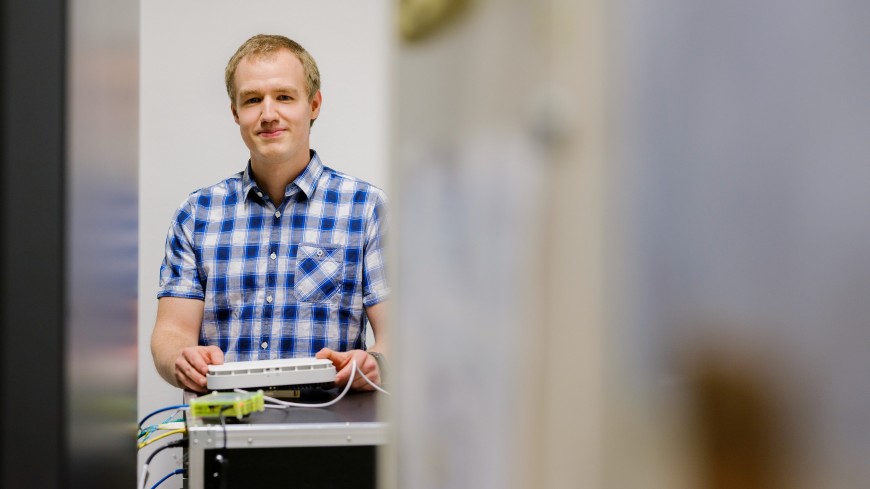Maintaining reliable connections
Thanks to “Athene Young Investigator” Tobias Meuser, mobile networks are becoming more resilient
2022/04/14 by Astrid Ludwig
How can the future 5G communication network be made more resilient? How can the stability and safety of data traffic and mission-critical applications be ensured in the next generation of mobile networks even in the event of disruptions or failures? Dr Tobias Meuser is researching the resilience of the 5G network. Dr Meuser has a doctorate in electrical engineering and works as a project manager in the Collaborative Research Centre MAKI – Multi-Mechanisms Adaptation for the Future Internet. He has been head of the Adaptive Communications Systems group at the Department of Multimedia Communication since 2020 and, most recently, was made an Athene Young Investigator at TU Darmstadt.

Anyone meeting Tobias Meuser in his Zoom chat room will think they have come to the command bridge of a spaceship. The background setting of his screen clearly shows that the 28-year-old is not only enthusiastic about computer science, but is equally keen on the Hollywood science fiction epic “Star Wars”. And somehow, the two go together. Both deal with technologies of the future and how to overcome future possible uncertainties or threats. Tobias Meuser is researching the resilience of the 5G network and how new generations of mobile networks can be made more resilient – for instance, how to maintain connection and functions even in the event of malfunctions, failures or hacker attacks.
Crucial component
His focus is the core network, which forwards data in very large quantities. In mobile networks, the core network connects the individual access networks to the Internet, for example, to allow telephone, apps or social media services. Dr Meuser is researching the improvement of the stability and reliability of this core network, focusing on the so-called User Plane Function (UPF), a crucial component in the infrastructure architecture of the 5G network that forwards data packages. “If the UPF fails, then nothing will work any more,” explains the computer scientist.
Meuser and his team want to build parallel structures and functions on a second level that will step in in the event of a malfunction or complete failure. A kind of backup or duplicate that maintains the network functions. However, this will cost additional resources. So what balance is to be maintained? The Athene Young Investigator is also researching when which duplicate would have to be started and to what extent if there were an emergency.
If the UPF fails, then nothing will work any more.
It may be irritating if a mobile phone connection fails or a video conference is a bit wobbly, but it's not necessarily a threat. However, it's a different story if we're talking about applications for modern cars with autonomous driving or intelligent factory structures that use robots. These generally use cable connections today for that very reason, and the research by the TU scientists under Tobias Meuser is intended to make future radio networks so reliable that cables are no longer required.
Numerous cooperations
The researchers maintain numerous cooperations with industry. They are currently also working on the development of a campus network, for example for company premises or facilities that will allow data to be kept locally and ensure networks are better protected. Similar to an intranet service. The team has built a demonstrator in the Department of Multimedia Communication that will one day be a prototype.
Dr Meuser discovered his passion for computer science at an early age. He learnt to program in the sixth grade, and at high school he skipped two grades of the computer science course. He studied information management remotely with the University of Hagen while still at school, completing his bachelor's degree just a few months after finishing high school. Because he was already familiar with the TU from the mathematics Olympiads, he signed up for the master's degree in computer science at Darmstadt straight after school. “I've always found learning easy,” says Dr Meuser. It only took him three years to achieve his doctorate in electrical engineering at the TU, graduating in 2020. He was a co-applicant, and thus project manager, for the Collaborative Research Centre MAKI in subproject B1, which deals with the monitoring and analysis of networks.
He is particularly pleased that the university is supporting him as an Athene Young Investigator because he appreciates the independence that the funding programme gives him. He can now create his own lectures and supervise doctoral candidates independently. His professional desire: a professorship in communication networks. In view of the pace of his progress so far, it probably won't be long before he achieves it.
